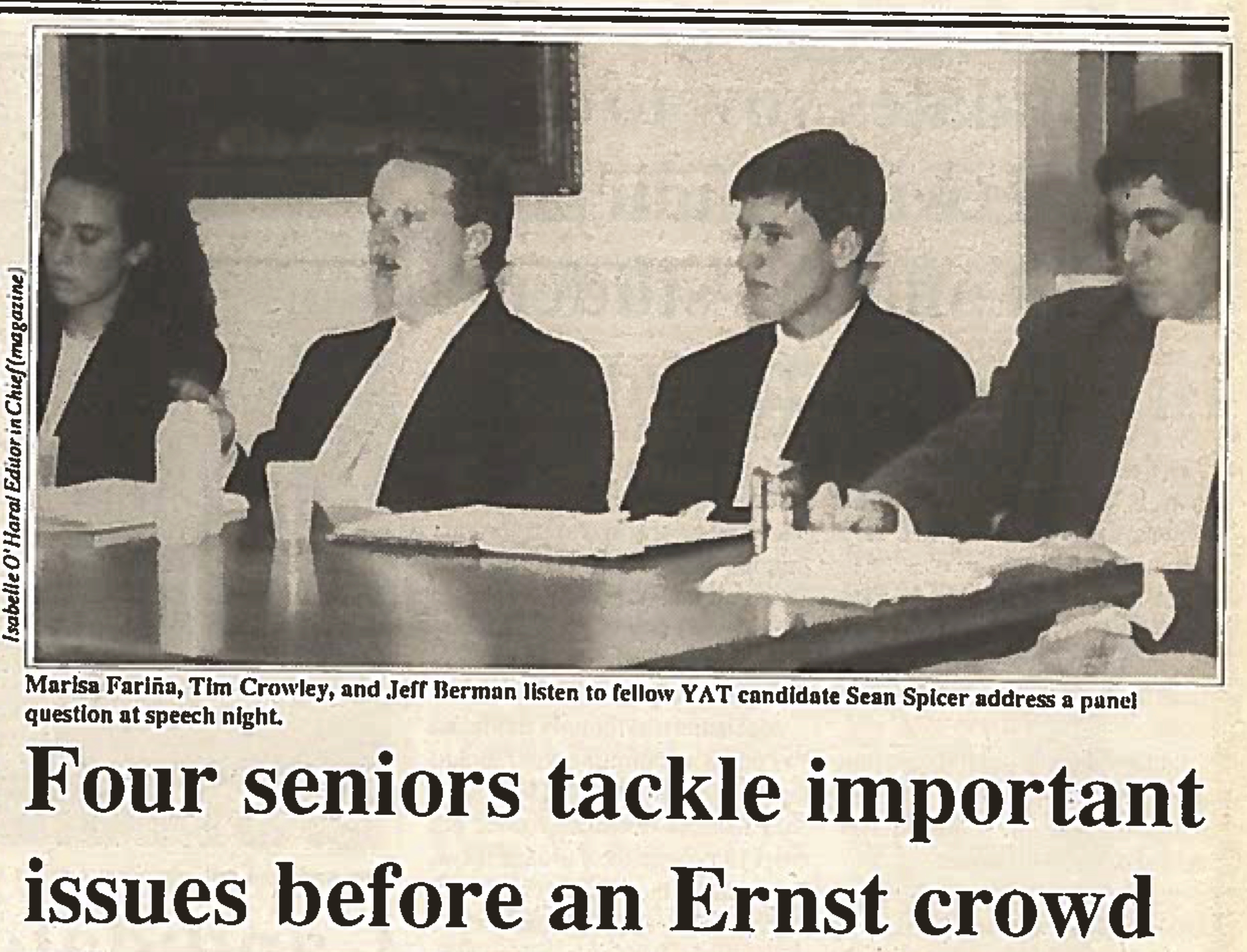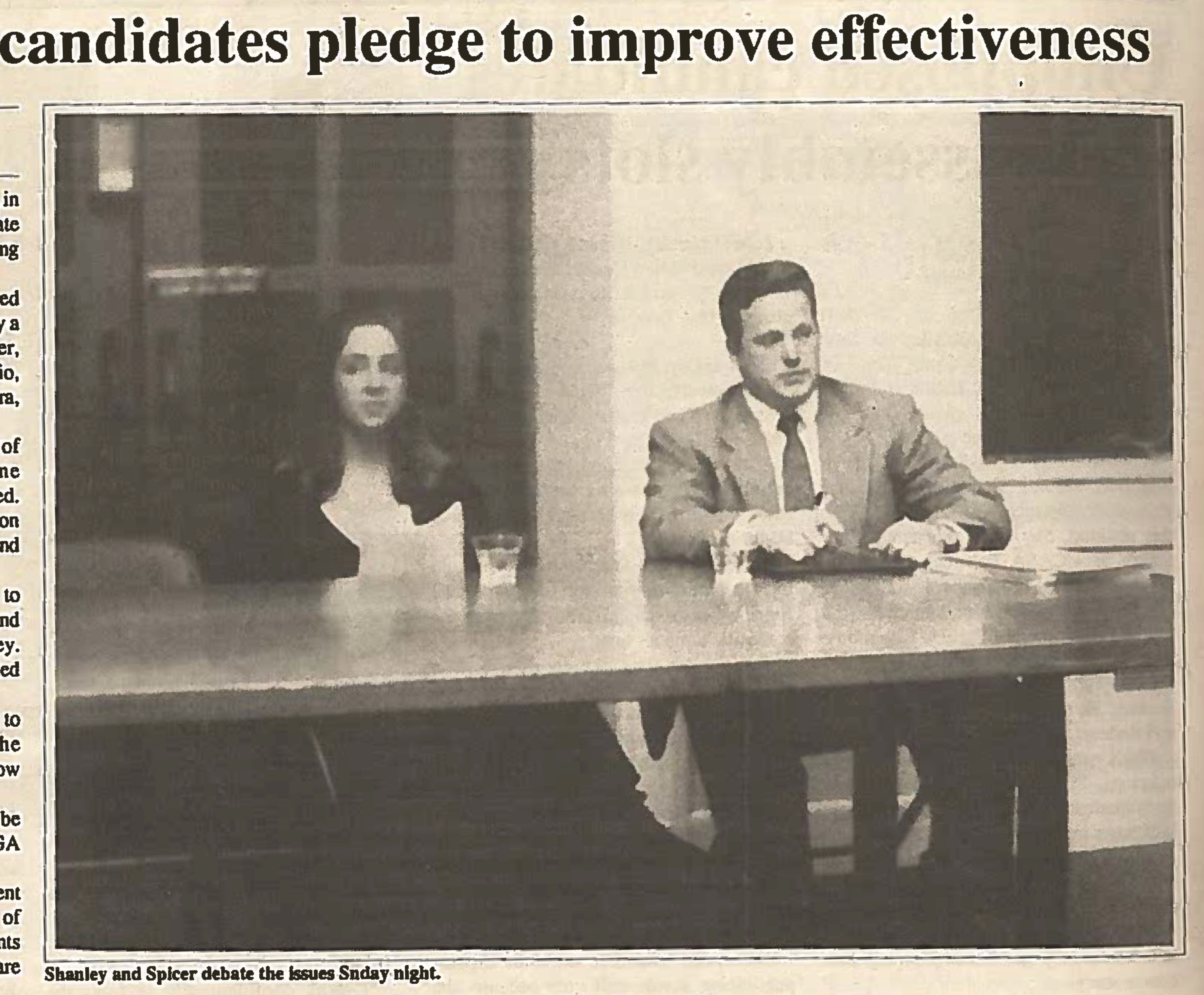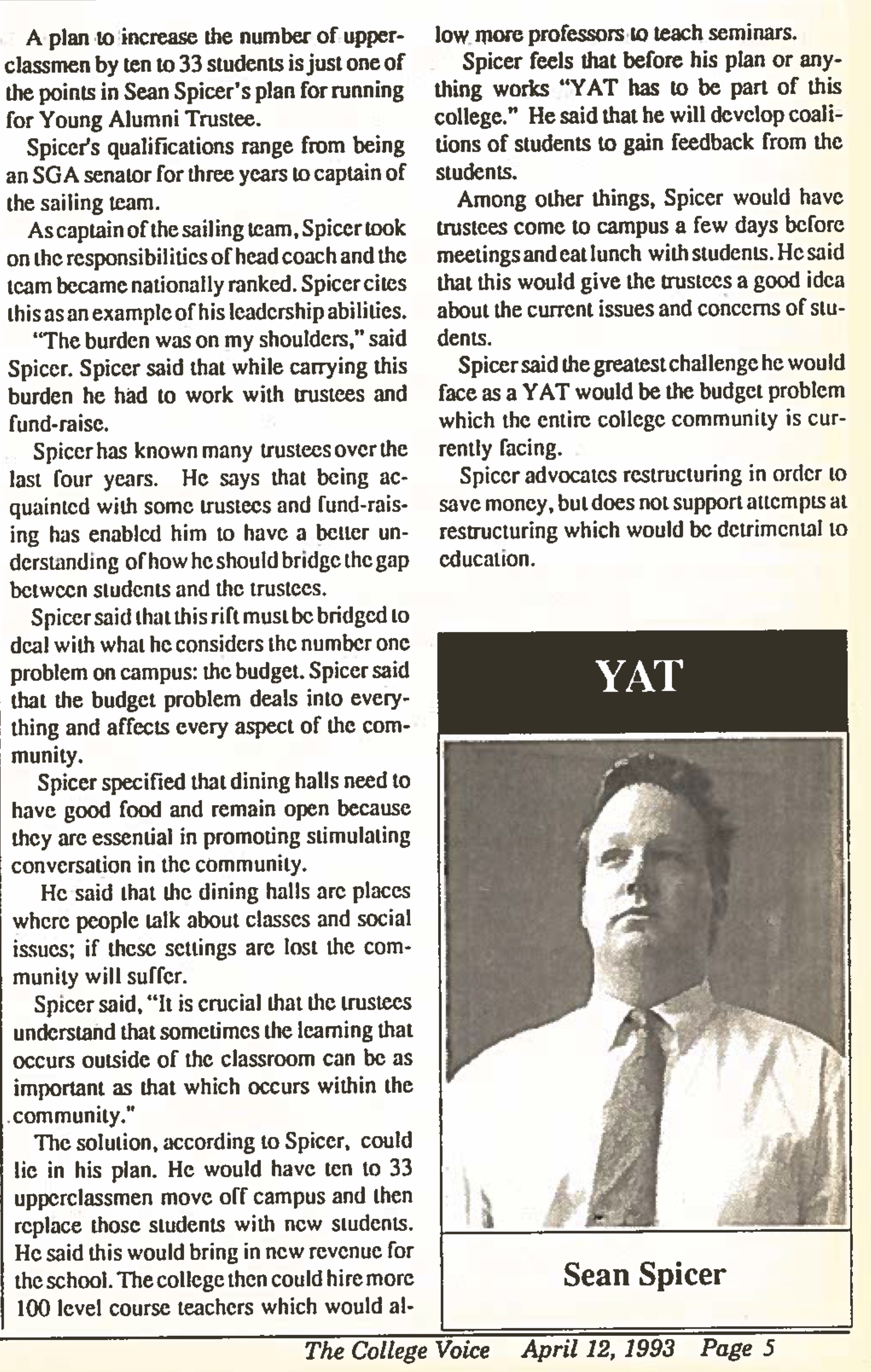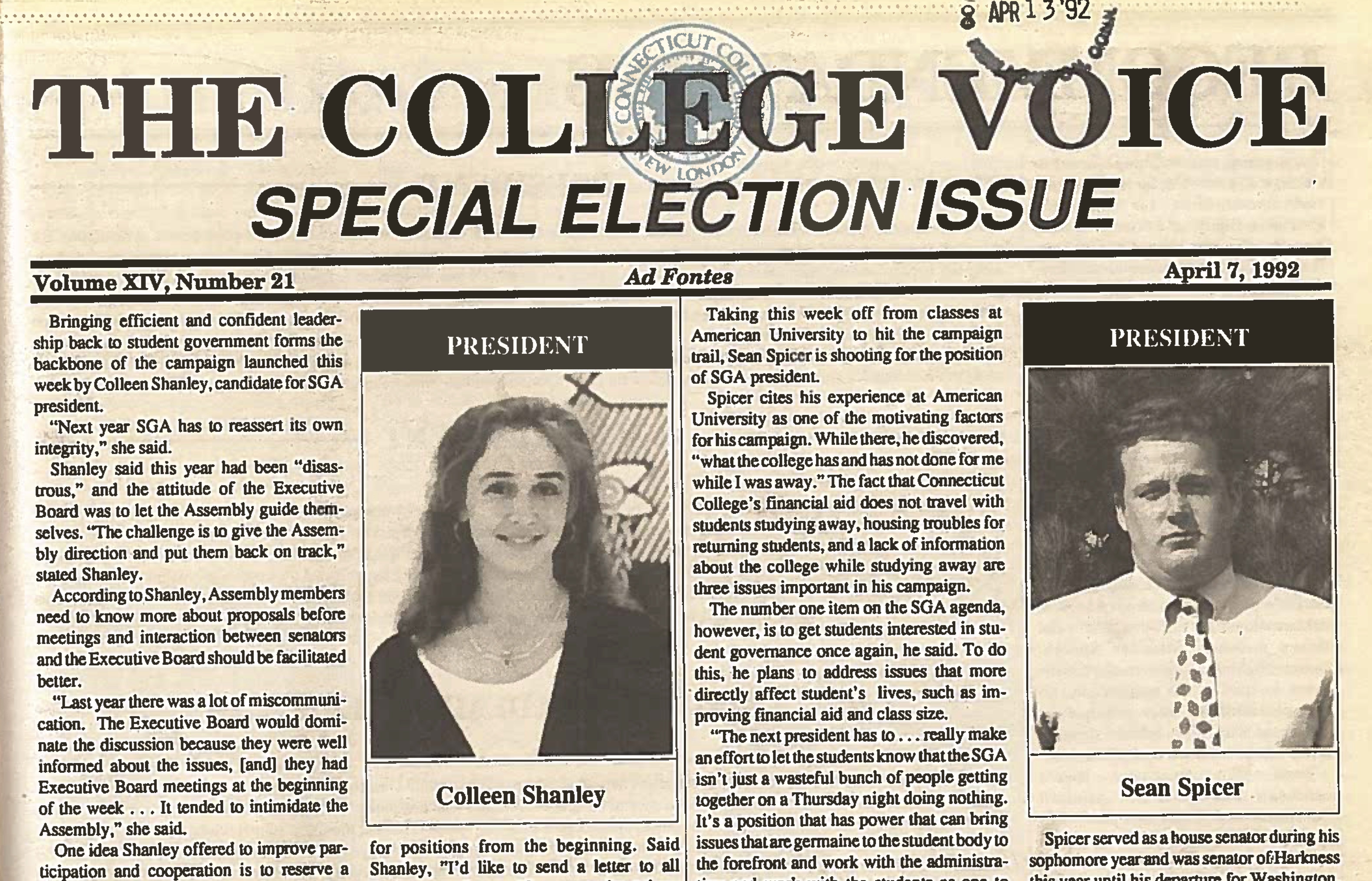As it turns out, The College Voice did not invent White House Press Secretary and Conn alumnus Sean Spicer’s infamous college nickname. Keep reading below or listen above as Dave Bry, Spicer’s first year roommate, details this and more in conversation with Voice Editor-in-Chief Maia Hibbett. Bry is a 1993 Connecticut College graduate and the author of Public Apology: In Which a Man Grapples With a Lifetime of Regret, One Incident at a Time. More of his ruminations on Spicer can be found in an article for The Guardian titled “The Trump surrogate who used My Little Pony to defend Melania? My college roommate.” To accompany the audio, below we have included the full text of the interview, though an excerpted version ran in our Feb. 6 print edition. To see what ran in print, download a pdf of our latest issue.
The College Voice: As you know, I’m calling to interview you about your former roommate here at Conn, Sean Spicer, and I guess I’ll just start off with a really easy, softball question. Where did you guys live on campus when you were here?
Dave Bry: We lived in Marshall, dorm room 212, so in the Plex, at the way tip of the Plex, all the way down, like, hidden as far away from the pretty buildings as you could ever hide anything.
TCV: Wow, that’s really interesting because there’s no longer a Marshall dorm here.
DB: Oh, I’m dating myself.
TCV: What was that dorm like back then, you know, and on campus in general, what would you say the political climate was like?
DB: That dorm was, I guess like a kinda standard college dorm, very cement walls—they had put three students into what was clearly meant to be a room sized for one or two people. Our other roommate was named Jeremy Beard, and it was, so you know like living in a cement-walled little prison cell with two other people. It was the gross, the room—like a college dorm room—you know, so grim, those buildings compared to all the nice old stone buildings on campus, and here you get stuck in this like, horrible 1967 design or something—really really, really ugly.
The political climate on campus—that’s an interesting question—I mean, I came from a high school that was really—I grew up in a very conservative area, and it was a high school that, you know, we weren’t into politics, like, at all. No one paid any attention, I think. Anyone that did probably was teased for it. And then I got to college, and it felt very liberal to me, very liberal. And it affected my life in lots of ways, and it like, for the first time, I was around a lot of people—my parents were among the only liberals; they moved to a very conservative suburban town. We were one of the only liberal families, one of the only Jewish families in like an all Irish and Italian town, and so I was like really impressed. I remember like when people went out and like walked and marched in opposition to Apartheid in Africa, that was like, a really big deal for me, because I was like, I’d never seen anything or been a part of anything like that, and it was very very exciting to me. And I was like oh my god, I found myself at this great, you know, liberal place. Now, you know, throughout college, I ended up going to visit friends at Wesleyan, and learned that Connecticut College was quite conservative compared to some places, and then I’d visit places like Trinity, and learned that Connecticut College was really quite liberal on the spectrum. I think among the NESCAC schools, or whatever you want to—you know, the type of schools that are like Connecticut College, the little liberal arts—New England liberal arts colleges, very small—I think Connecticut College is probably about in the middle politically, and I imagine that you have things going on like, colleges in general skew liberal, but maybe preppies in New England—kids from New England prep schools skew conservative, so you get kind of a mix of that, but I would say that it was a liberal place. You know, Sean I think started, or not started, but joined the Young Republican club or something, and he was Republican, and that was obviously kind of a rarer stance/position than most of campus. I would guess that it was 85% liberal versus 15% identifying conservative.

Spicer (second from left) debates Marisa Fariña, Tim Crowley and Jeff Berman for Young Alumni Trustee. Fariña (far left) won the position.
TCV: So you just mentioned that Sean joined the Young Republicans club. What were his other involvements and what was his presence like on campus? His major, anything like that?
DB: Let’s see—I’m sorry repeat that?
TCV: I’m just wondering about his club involvements and his academic interests on campus, and how you think that contributed to his presence.
DB: Oh, right. He was very into sailing, and he had grown up sailing, and I know one of the things that he talked about a lot was how that kind of provided this automatic little social club for him at the school because all the sailors had to get up really early to go to practice every morning, and so you know their schedules were dictated by their sailing classes, and everything else fell behind that. So the sailing club at the school, I remember it was a very insular club—not, sailing team, I’m sorry; I keep calling it a club—it was a team; they competed; they would race against other schools that had sailing teams. And so that really seemed to be his main deal. That was his scene. Those were the friends I think he hung out most with.
He majored in I believe Government, and I wanna say Chinese. Early on, I remember this conversation one of our first days when me and Jeremy and he were talking about what we were gonna major in, and I was so amazed that Jeremy and he both were like—government and business stuff; they both were very into business, and I had no interest in anything like that; I don’t think I knew—I wanted to major in English, I guess, but they were both so impressively aware of like, “This is gonna help me get a job!” And I was like, that’s not why I went to school. And so I remember Sean being like, “oh yeah, I’m gonna take Chinese, too,” and Jeremy I think double-majored in Chinese and Economics. I think Sean majored in Government, maybe with a Chinese minor, but I’m not even sure if he like, you know, kept up and went through with it—I’m sure the school would have these records, right, like, when he graduated there must be been something written down like: Sean Spicer graduated with either a History diploma or—I’m sorry, Government diploma, or Government plus Chinese or whatever.*
TCV: And so would you say he was well-known on campus? Well-liked?
DB: Um, no. Not well-liked. Not like hated. How can I describe Sean Spicer? Because he was kind of an interesting guy. He was very into, like, always having a sense of humor, and funny, and laughing and chatty. And that was something that was, you know, kind of pleasant about him. But he wasn’t so good at it. And he wasn’t very popular, I would say—he was like, he would walk into the room and everyone would kind of go: “Ugh, Spicer.” But he was aware of that, and so then would like, play with it, so he’d be like: “Hey, come on guys! It’s just me! Come on, let’s have a beer; we love each other! Yeah, come on—oh, I know you don’t like me, but that’s just because you don’t know me!” He’d put his arm around you, and kind of be like, “come on!” you know? And so it was this very interesting combination of characteristics, where you could tell he really wanted to be liked; he tried a little too hard. He brought—you know, we had this thing freshman year during orientation where you were supposed to bring one item that describes yourself, you know, that if you would bring to put in a museum about yourself it would let them know about yourself, and I remember he brought his fake I.D. And he said, “Yeah, this is my fake I.D., and it says a lot about me because I really like to drink beer.”
TCV: Okay.
DB: And he kind of got that silence in reaction, too, and everyone was kind of like, “oh, god.” And so that sort of describes him pretty well, I think. But, you know what? I don’t wanna like—it’s weird; you think back to the way people were, and he was kind of a tool, but like, man, I certainly was a jerk in lots of ways, too. I don’t particularly like the person that I was when I think about being 18 years old, so I wanna give people a break, you know? I never thought he was like a bad, evil, hurtful person. He was, like I say, kind of a clown. And he kind of knew it, and he got a little bit clowned, but he had a good sense of humor about it, always, and so he was never anything like, unpleasant, or really really disturbing, he was like a pain in the ass. But overall, I always thought, like, a good-hearted person. So I’d see him on campus, and it would be like, “Hey, what’s up Sean?” “What’s up, Dave?” you know? It was fine, for the next four years, I mean. We didn’t hang out in the same circles, but it was certainly civil. He was fine. If you ended up at a party where he was drinking a beer, I would—we’d drink a beer together and talk about what was going on: “Remember freshman year when we had to live in that crappy dorm?” you know, like that.
I only lived in the room with him for about one half of the first semester. ‘Cause a senior moved out on our floor, and then left the door open, and so I kind of squatted so I could have my own room. And so, my girlfriend used to come up and visit me from a different school, and so we would want to have privacy, and so we moved a bed in there—we dragged a bed; I actually put my posters up, so I really sort of moved my whole thing out of that room. And then the next semester, my girlfriend actually—kind of weird, inter-scene goings-on—came to the school and was a guest student at the school for a while, and so I kind of moved into her room—inter-scene might not be a word, now I’m embarrassed that I’ve used it in an interview—so then I spent my time in her room, but I always had some stuff in my original room, so I would get back there, and I hung out a lot on the floor; all my friends were on that floor and in that dorm, so we were still around each other a lot.
TCV: Okay. And so when The College Voice assigned Sean Spicer his infamous nickname, was there a big campus reaction? Did a lot of people notice?
DB: Yes, yes. It was a thing, for sure, a lot of people remember it—I know from talking to other people I’ve been in contact with, a lot of people remember. It was funny; he was—he was a Republican trying to run for president of the class every year. Every year he ran for class president. Every year he lost. Every—four years running for class president, four years losing. So he was kind of, he kind of made himself into Sean Sphincter, you know? That was his nickname; people teased him about that, and then, when it got into the press, you know, he had that reaction, and it was a story on campus.

Spicer (right) debates Colleen Shanley (left) for SGA President. Shanley was later elected to the position.
TCV: So, did The College Voice come up with that nickname, or was it a preexisting thing on campus?
DB: Oh, no, I don’t think so. That was just a preexisting nickname. I think one of the people that worked on the Voice was kind of in this group of guys that were sort of friendly with Spicer on the sailing team and they kinda teased him, and then he put it in the paper first, I think. So maybe it was like, that person invented that nickname, and it was not—no, I can actually remember that no, lots of people had that nickname for him before it ran in the paper, I think, to the best of my memory.
TCV: Okay, that’s interesting. We hadn’t heard that angle here yet.
DB: You know, it’s a long time ago. I’m doing my best with my memory. But I think that’s right.
TCV: Yeah, and so you’ve already spoken to this one pretty significantly, but as a roommate, just as a person to live with, what was [Spicer] like?
DB: He was kind of gross, really. I mean, but look, again, I have to take some complicity in this, like—so I had this habit of bringing up the ceramic coffee mugs from Harris. After every meal, I would bring up a coffee mug to the room. And then I would just leave the coffee, finish my coffee, and I would leave the coffee mugs around the room. And so our room became, like, every inch of every flat surface of our room had a coffee cup on it. It was ridiculous, like, literally 30 or 40 coffee mugs around the room. And I think Spicer and Jeremy were probably always like, “Get rid of these coffee mugs!” but I didn’t really know what to do with them, and so I think I was like, you know, “Nope, sorry dudes!” And very much in your freshman year of living in a dorm with two other guys. I think it’s really like, it’s kind of on whoever is being grossed out—he’s just gonna lose, you know? It almost becomes this, like, “Oh yeah? You think you can be gross? Watch how gross I can be.” So it wasn’t—I wasn’t—it was almost like a competition where, like, “No, I’m not gonna clean up. You guys are the dorks for caring about having a clean room. So if you want something done about the coffee mugs, fine, take care of it, you know; it’s not my responsibility,” which is a horrible way that boys who are 18 years old think.
But was Spicer did was like, he dipped, you know, he chewed tobacco, and he smoked, and so like, all the coffee mugs that I had left there ended up getting filled with like, his tobacco spit and tobacco ashes, from the smoking, which just made them like, so much, way more gross. And then it was like kind of a little war about like, okay well, who’s gonna clean them up? And I was like, “I’m not touching those things because they have your dip spit and ashes in them and are disgusting, so I’m gonna touch them.” And he was like, “Well you left them there, so you get rid of them.” So they ended up just staying there, for like, you know a good month, maybe more. Probably until I like, moved out of the room there were these coffee mugs with remnants of coffee and tobacco juice and ashes in them. Horrible, disgusting, you know. Funny you think about how, like—funny for me, as an old person, to think at like how human beings lived in dorms. I don’t know, you might still live that way; I’m sorry if you do, but anyway.
TCV: Not quite.
DB: Good, good. Good for you. You should definitely—cleanliness is next to godliness.
TCV: Okay, and so you already mentioned that after you were roommates you kind of just kept a casual relationship on campus, but did you ever stay in touch at all after graduation, or was the next time you saw Sean Spicer when he was the Press Secretary?

Spicer’s candidacy for Young Alumni Trustee.
DB: The next time I saw Sean Spicer was—no, not when he was the Press Secretary. I mean, you know, I read the papers, and he’d been coming up through politics. There had been—he was working for certain congressmen that would be passing certain actions or pushing for certain laws, let’s say, and he was often a spokesperson for these people. So reading the paper, no, I wanna say—even in the nineties—maybe not in the nineties, but early in the century, yeah, he was someone whose name would get in the paper, and they way people pay attention to that stuff, when it’s—you know, someone would send an email, be like, “Look at Spicer! He’s got this job for this senator!” You know, “He’s got a pretty big job for a senator!” I saw him in the paper; he gets quoted in the paper trying to press for some law, so. Yeah, so we’d been following, I had followed his career.
TCV: Have you seen him in person since [college]?
DB: No. No, I haven’t seen him in person since college ended.
TCV: Okay, well I think that takes care of all of my questions for today. Do you have anything to add?
DB: No. I’m happy to answer your questions. I’m psyched to see the story. Are you gonna—it’ll be online at The College Voice website?
TCV: Yeah, it’ll go up online. We print on Monday, and the articles all get uploaded in that following week, but this one will probably be one of the first ones to go up online.
DB: Great! Email it to me when you have it finished. I’m interested to read it.
TCV: Okay, I definitely will. Thank you for speaking with me.
DB: Sure, thanks Maia. Good luck writing it, and have a good rest of the school year.
TCV: Okay, great, thank you.
DB: Thank you, bye-bye.
TCV: Bye.
*Editor’s note: According to the Connecticut College Alumni directory, Spicer graduated with a major in Government.











marshall dorm became Johnson dorm in 2008.